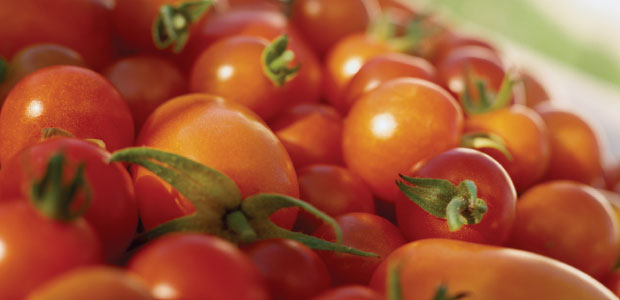Advertisement
Loving Lycopene
“Home grown tomatoes, home grown tomatoes, What would life be without home grown tomatoes? Only two things that money can’t buy, That’s true love and home grown tomatoes…” -from “Home Grown Tomatoes”, written by Guy Clark and recorded by John Denver I hummed John Denver’s tomato song throughout the spring as I planted tomato seeds … Continued

“Home grown tomatoes, home grown tomatoes,
What would life be without home grown tomatoes?
Only two things that money can’t buy,
That’s true love and home grown tomatoes…”
-from “Home Grown Tomatoes”, written by Guy Clark and recorded by John Denver
I hummed John Denver’s tomato song throughout the spring as I planted tomato seeds indoors and then tenderly transplanted tiny plants into my garden in May. Now I can barely contain my salivary glands when I think about the juicy, flavour-packed tomatoes I’ll have in August.
I love tomatoes and I love all the good things they do for me and my family. That’s because tomatoes are a potent source of lycopene, one of the strongest disease-fighting compounds known to science.
This carotenoid, which gives tomatoes their red colour, can lower the risk of some of the most deadly cancers, including breast and prostate cancers. Lycopene can also protect your heart and eyes and can even help preserve your memory. All you need to do is consume just one serving a day. Here’s how lycopene works.
Protect Your Heart
Lycopene offers all-round protection for your heart. German researchers found that people with high levels of lycopene cut their risk of a heart attack by 50 percent. That’s probably because lycopene helps lower dangerous LDL cholesterol and has even been shown to lower blood pressure. Lycopene also helps prevent clotting, and some research suggests that lycopene helps strengthen blood vessels, offering protection against heart attack and strokes.
Prevent Cancer
Those juicy tomatoes can protect against some of the most dreaded cancers. A growing body of evidence shows lycopene protects against hormonally related types of cancer, including prostate and breast. A landmark Harvard study of 48,000 men showed men who ate the most tomato products were the least likely to develop prostate cancer. Another Harvard study of nearly 40,000 women showed lycopene has the same protective effect against breast cancer. A smaller Harvard study suggests lycopene also protects against ovarian cancer.
Lycopene has even been implicated in helping prevent lung cancer in smokers, perhaps because its powerful antioxidant effect somehow neutralizes the carcinogenic effects of cigarette smoke.
Preserve Memory
Researchers at the University of Kentucky followed a group of elderly Catholic nuns who got the same diets and the same medical care. Those who consumed at least 30 mg of lycopene in their daily diets were 3.6 times more able to care for themselves physically and had sharper memories than those who didn’t get their daily spaghetti sauce or tomato juice.
Save Skin
German research shows that eating just 1.3 ounces of tomato sauce a day reduced sun-induced skin damage by 40 percent. That makes tomato sauce a sunblock you can sink your teeth into.
Experts say lycopene will not only help protect you from skin cancers but will also help you preserve youthful firmness and prevent wrinkles that add years to your face. Yet, the experts also say it’s wise to use additional protection against the sun’s harmful rays.
Improve Eyesight
Preliminary studies suggest that lycopene may actually cut in half the rate of macular degeneration, the major cause of blindness in people over 65. Biochemist Sandiv Agarwal, PhD, a researcher at the University of Toronto, says, “We think lycopene will also work to prevent cataracts and vision problems because it is fat soluble and it is able to get to those areas like the eyes that are most vulnerable to oxidative damage.”
All this adds up to a delicious prescription: Eat ’em raw, eat ’em in salsa, spaghetti sauce, tomato juice, even on pizza–eat your tomatoes every day and stay strong and healthy! You don’t even have to wait until the tomato plants are harvested in August. If you’re not a huge fan of tomatoes, watermelon and pink grapefruit are also modest sources of lycopene. If you can’t eat tomatoes for some reason, lycopene supplements are easily available. The experts recommend 30 to 35 mg daily.




